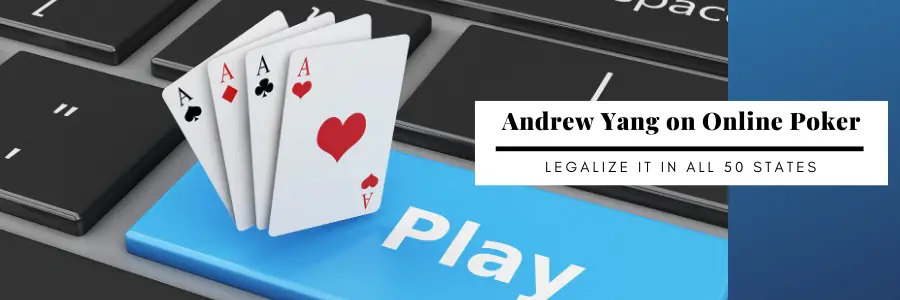Andrew Yang Calls For Federal Online Poker Regulation: Do We Need It?

Presidential candidate Andrew Yang scored some points with the poker community when he tweeted support for federal action on online poker. Yang’s heart seems to be in the right place, but his message is about a decade out of date.
The idea of legal online poker across the US has always been the end goal, but it’s evident it will only come to pass after a slow march across the nation, state-by-state.
Six states (if you count Arkansas) have passed legislation legalizing online poker since 2012. Over the same period, online lotteries have launched in 11 states. And six states and counting have launched some version of online sports betting.
In short, online gambling has charted its own course and determined itself to be a state-level decision. All the federal government has done is get in the way.
What Exactly Is Yang Advocating?
Yang isn’t the first politician or presidential candidate to pay lip service to the poker community. In 2011, Libertarian candidate Gary Johnson made the issue one of the central focuses of his campaign, and federal online poker legislation was a pet issue for a few members of Congress. Joe Barton unsuccessfully tried to legalize online poker at the federal level in 2015.
But what exactly Yang is calling for isn’t clear. His tweet leaves a lot of room for interpretation.
The line “we should clarify the rules” could mean legislation legalizing online poker (or online gambling), or it could simply be a call for a Wire Act fix.
Congress Is Unlikely to Legalize Online Gambling
Congress legalizing online gambling nationwide is the longshot of longshots. Beyond that, the legislation would be tricky, as it would have to provide states with an opt-in or opt-out option. As such, Yang’s “legal in all 50 states” line is little more than hyperbole.
The federal government unilaterally superseding a state’s ability to legalize/criminalize a certain form of gambling wouldn’t hold up in courts. So, the government isn’t going to force legal poker on all 50 states. The only solution is to include the previously mentioned opt-in or opt-out language in the bill. But like New Jersey with PASPA, a state may come to regret its decision down the road and decide to take the matter to court.
And then there is Congress’ shoddy history of gambling legislation. From the Wire Act to PASPA to IGRA to UIGEA, Congress has managed to sow confusion into each of these issues.
After the recent PASPA repeal, and considering the current Wire Act debacle, I can’t imagine 1) Congress wanting to pass federal gambling legislation, and 2) that legislation being a positive development for online gambling in the US. And 3) I can’t imagine why poker players would want Congress involved.
Congress Could Amend the Wire Act
A more positive action (but still unlikely) is a Wire Act rewrite. Amending the Wire Act would put an end to the Department of Justice issuing new opinions on the Wire Act’s applicability to online gambling every five or so years.
And the fix would be easy. Congress can rewrite the current law (in grammatically correct English) and clarify the Wire Act only applies to illegal (unlicensed online gambling operations) and not state-licensed online gambling operators.
Bottom Line
Yang needs to clarify his tweet.
If it’s a call for federal legalization of online gambling, it’s not only a pipe dream; it’s bad policy. On the other hand, if it’s regarding the federal government amending the Wire Act or taking some other action that unequivocally allows states to determine their online gambling destiny it would be easier to get behind.
Maybe he’ll do that on Joe Ingram’s podcast?







